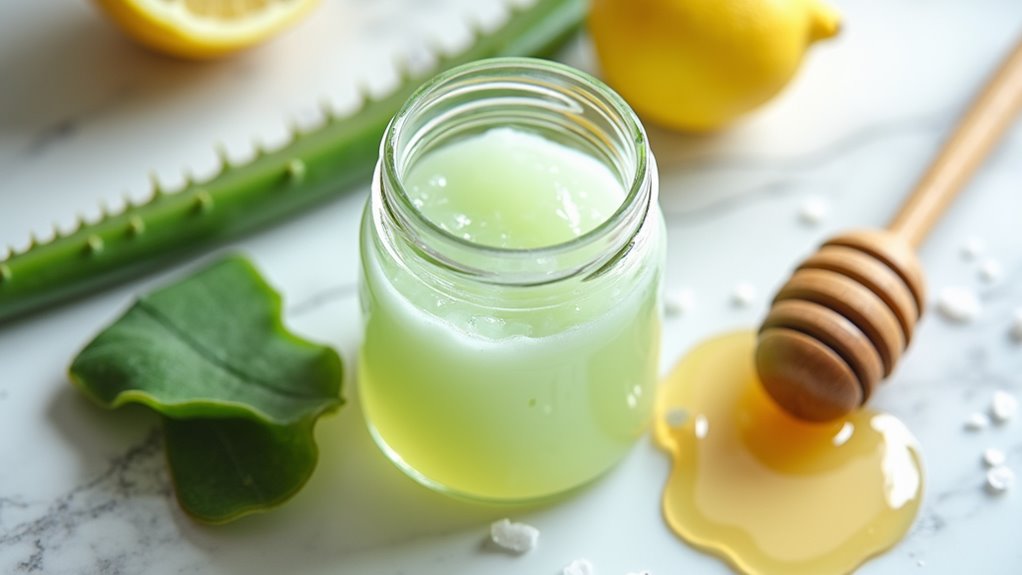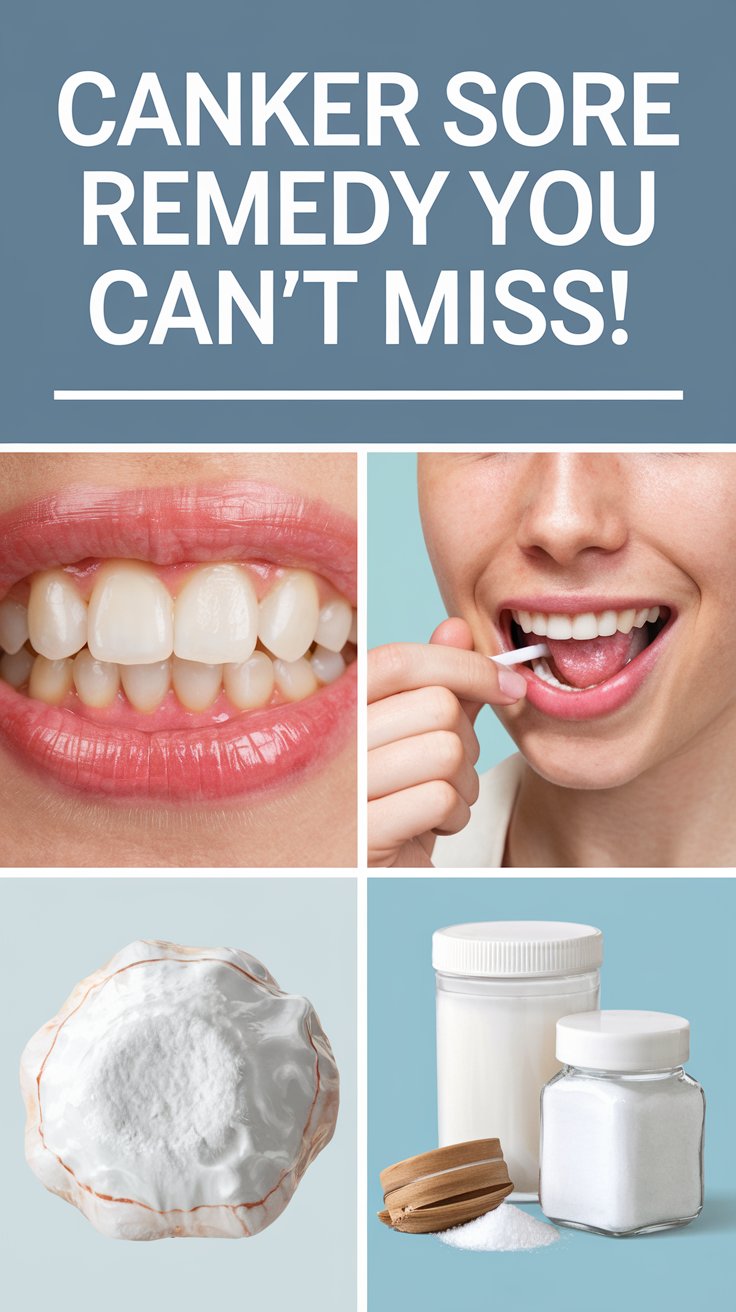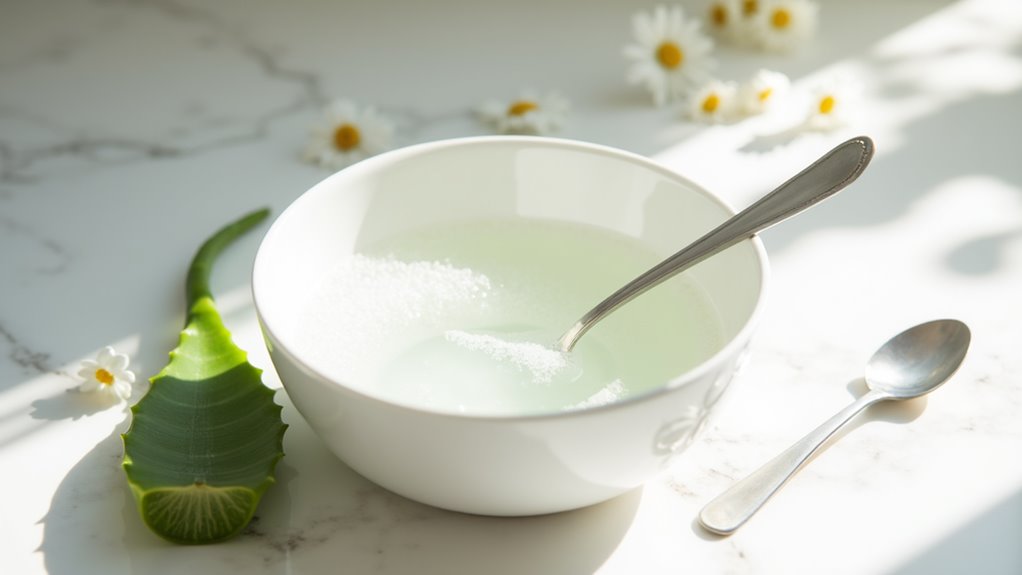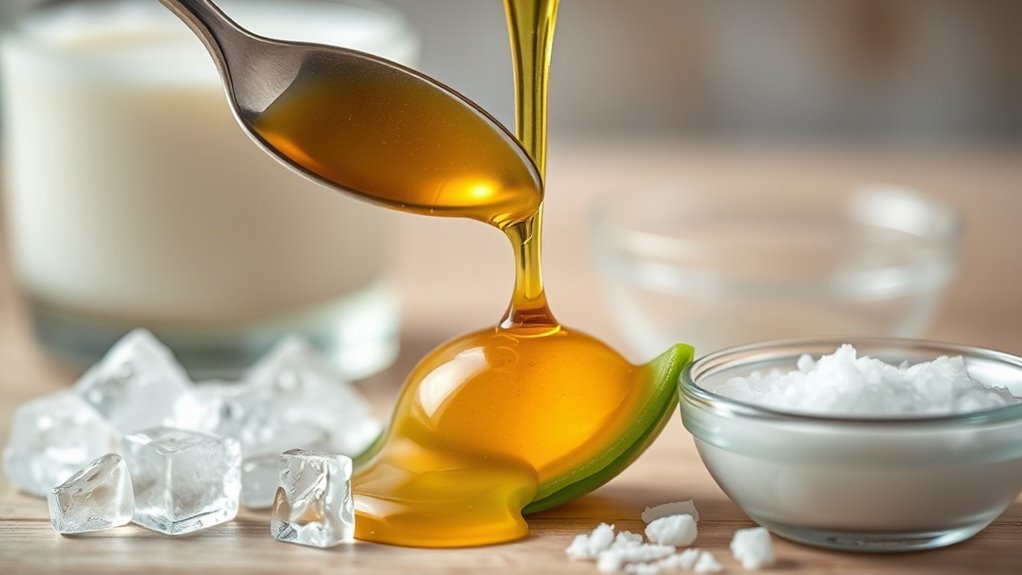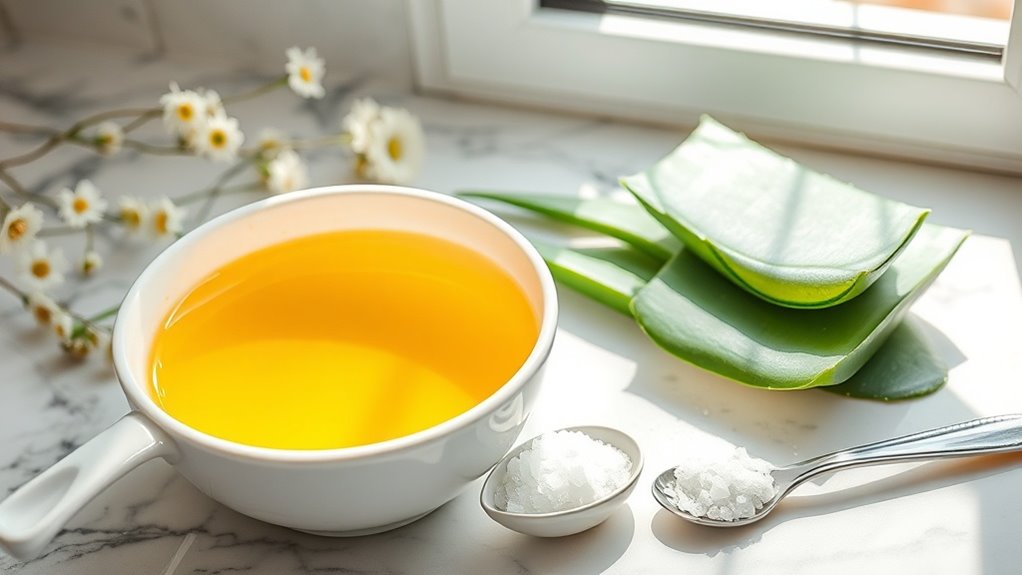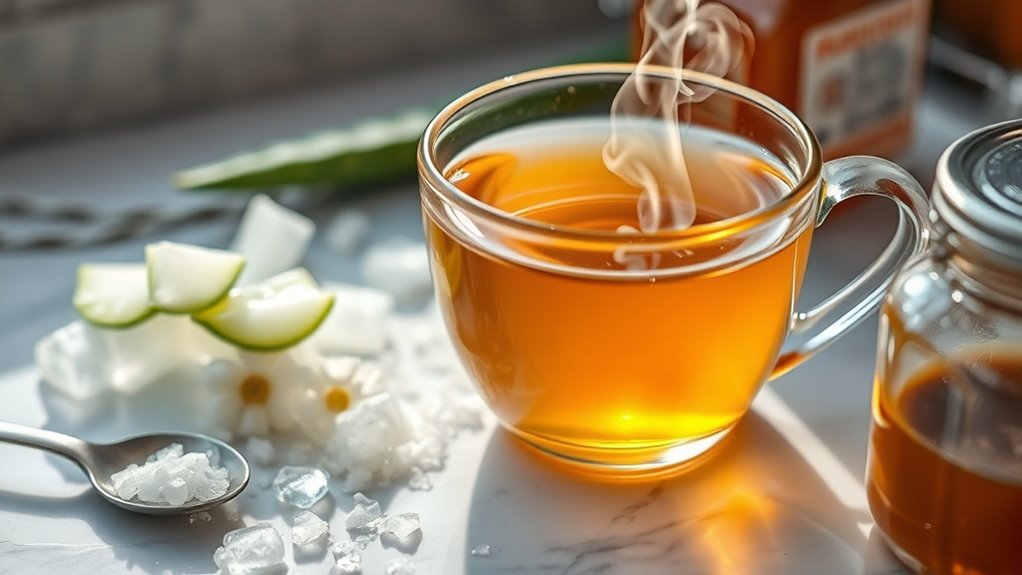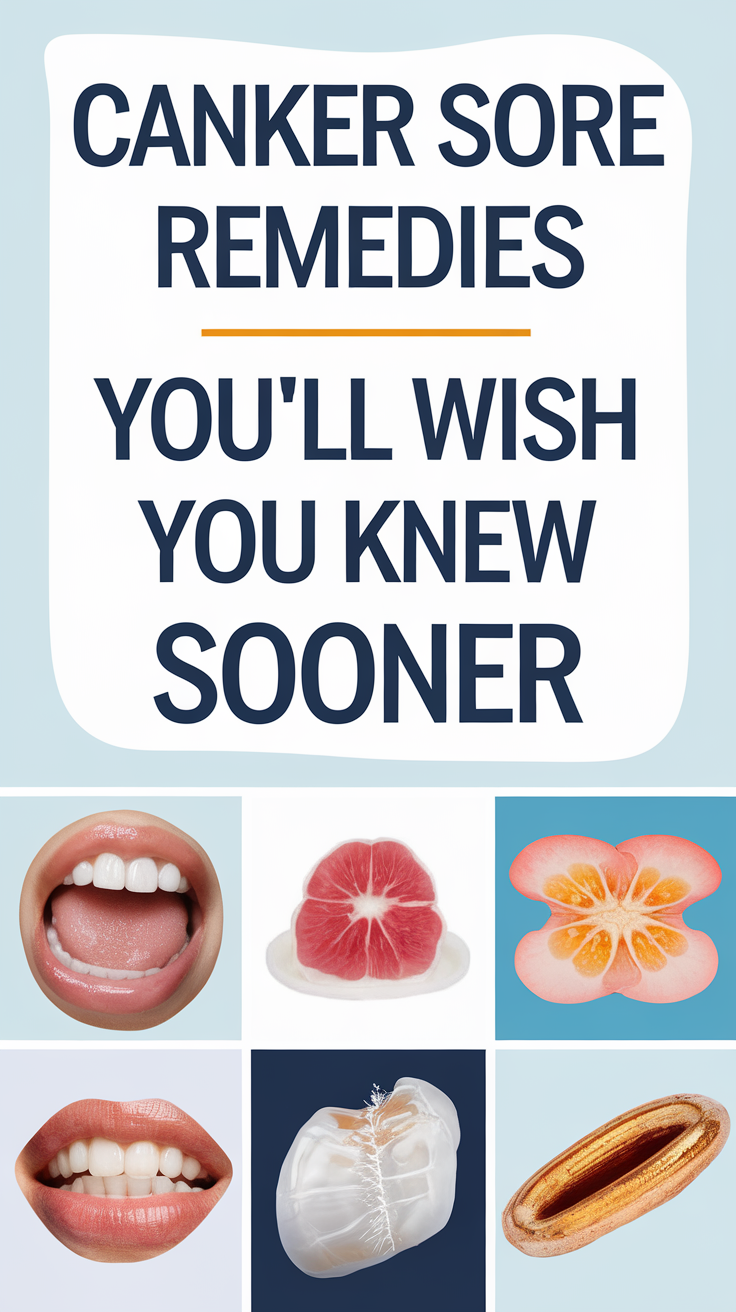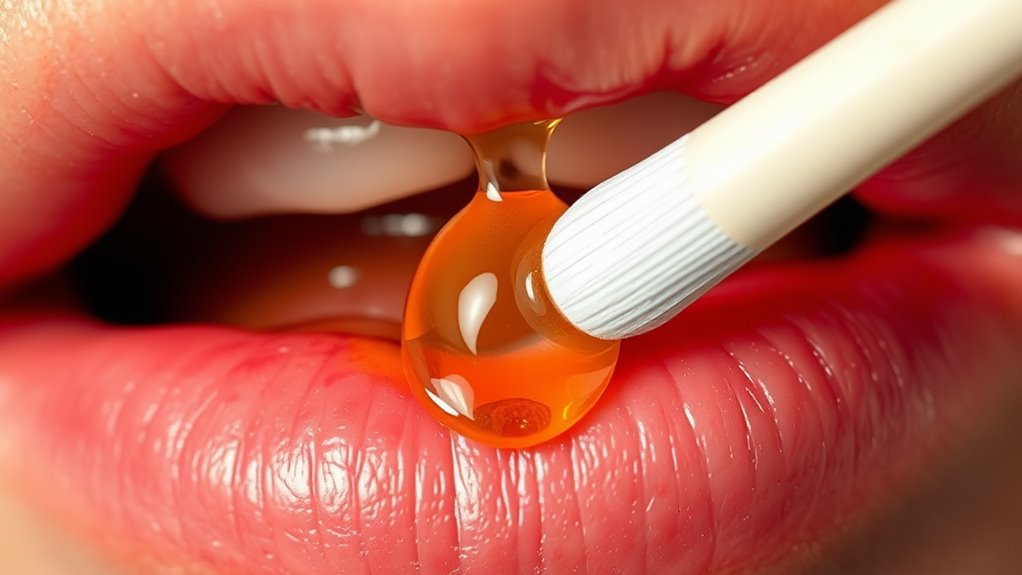Canker Sore Remedy You Can’t Miss!
For fast canker sore relief, try a simple salt water rinse by mixing 1/2 teaspoon salt with warm water and swishing for 30 seconds. You can also apply raw honey directly to the sore 3-4 times daily or dab on diluted clove oil for pain relief. Avoid acidic foods and opt for a soft-bristled toothbrush to prevent irritation. These natural remedies often work better than expensive over-the-counter treatments, and there’s much more to discover about managing these painful ulcers.
Key Takeaways
-
Salt water rinses provide immediate relief and promote healing by mixing 1/2 teaspoon salt with 1 cup warm water.
-
Raw honey applied directly to canker sores 3-4 times daily acts as a natural antibacterial and healing agent.
-
Pure aloe vera gel applied 2-3 times daily soothes pain and reduces inflammation of canker sores.
-
Vitamin B12 supplements (1,000 micrograms daily) can significantly reduce the frequency and severity of canker sores.
-
Benzocaine-based gels offer quick pain relief while protective pastes create a barrier against further irritation.
Understanding Canker Sore Types and Symptoms
While many people mistake them for cold sores, canker sores are small, painful ulcers that develop inside your mouth rather than on your lips.
You’ll find them on your inner cheeks, tongue, gums, or the roof of your mouth. These frustrating sores typically appear as round or oval-shaped lesions with a white or yellow center and a red border. They can make eating, drinking, and even talking uncomfortable.
You might experience three main types: minor, major, and herpetiform canker sores.
Minor ones heal within two weeks, while major sores are larger and take longer to heal. If you’re dealing with multiple small ulcers that cluster together, those are herpetiform sores.
Understanding which type you have helps you choose the most effective canker sore remedies for faster relief.
What Causes Canker Sores to Develop
The development of canker sores often stems from multiple triggers, and identifying your specific causes can help prevent future outbreaks.
You’re more likely to get these painful ulcers when you’re stressed, experiencing hormonal changes, or have a family history of canker sores.
Your diet plays a significant role too. Foods high in acid, like citrus fruits and tomatoes, can trigger an outbreak.
You’ll also want to watch out for minor injuries to your mouth from dental work, aggressive brushing, or accidentally biting your cheek.
If you’re deficient in vitamins B-12, zinc, folate, or iron, you’re at higher risk.
Some people develop canker sores from food sensitivities, particularly to chocolate, coffee, strawberries, eggs, nuts, or cheese.
SLS in toothpaste can also be a hidden trigger.
Salt Water Rinses: A Simple Yet Effective Solution
Among natural remedies for canker sores, salt water rinses stand out as one of your most accessible and budget-friendly options. You’ll find this solution particularly effective because salt creates an environment where bacteria struggle to thrive, while also reducing inflammation in your mouth.
To make your salt water rinse, simply mix 1/2 teaspoon of salt with one cup of warm water. Swish this mixture in your mouth for about 30 seconds, focusing on the affected area.
| Benefits | How Often | Best Practices |
|---|---|---|
| Reduces Pain | 3-4x Daily | Use Warm Water |
| Fights Bacteria | After Meals | Don’t Swallow |
| Speeds Healing | Before Bed | Rinse 30 Seconds |
For best results, you’ll want to maintain this routine until your canker sore heals completely, which typically takes 7-10 days.
Essential Oils for Canker Sore Relief
Several essential oils offer powerful relief from canker sores due to their natural antimicrobial and anti-inflammatory properties.
You’ll find that clove oil numbs the area and reduces pain, while tea tree oil fights bacteria that could worsen your sore. For best results, mix these oils with a carrier oil like coconut or olive oil before applying them.
Peppermint and chamomile oils can soothe the irritation and speed up healing. Just add a drop to your cotton swab and gently dab it on your canker sore.
If you’re new to essential oils, start with lavender – it’s gentle yet effective for reducing discomfort. Remember to dilute any essential oil you use, as direct application might irritate your sensitive mouth tissue.
Many canker sore sufferers have found lasting relief with these natural remedies.
Honey and Its Healing Properties
Known for its natural antibacterial properties, raw honey provides remarkable healing benefits for canker sores. You’ll find that applying a small dab of raw honey directly to your canker sore creates a protective barrier while reducing inflammation and pain.
The natural sugars in honey help draw out excess moisture, which speeds up the healing process. For best results, you’ll want to use unpasteurized, raw honey that hasn’t been processed.
Simply dab a small amount on your sore 3-4 times daily, especially before bedtime. Many people in our natural health community have found that Manuka honey works particularly well, as it contains additional compounds that fight bacteria.
Remember to let the honey sit on the sore for a few minutes before swallowing or rinsing.
Vitamin B12 and Zinc Supplements
While natural remedies like honey work from the outside, nutritional supplements can help fight canker sores from within.
Studies show that many people who get frequent canker sores are deficient in vitamin B12 and zinc. You’ll want to make sure you’re getting enough of these essential nutrients.
Taking a vitamin B12 supplement can reduce the frequency and severity of your canker sores. Aim for 1,000 micrograms daily if you’re prone to outbreaks.
Zinc supplements can boost your immune system and help your body heal sores faster – try 30mg per day. You’re not alone in this struggle; many others have found relief through these supplements.
Remember to consult your healthcare provider before starting any supplement regimen, as they’ll help determine the right dosage for your needs.
Aloe Vera Treatment Methods
Looking for a natural way to soothe your canker sores? Aloe vera’s natural healing properties can help reduce pain and speed up recovery. You’ll find this remedy especially effective when you apply it directly to the affected area.
| Method | Benefits |
|---|---|
| Pure Gel | Reduces inflammation, provides immediate relief |
| Juice Rinse | Cleanses area, prevents infection |
| Gel Patch | Creates protective barrier, extends contact time |
| Mixed Solution | Combines with honey for enhanced healing |
Simply extract fresh aloe gel from the plant or purchase pure aloe vera gel from your local health store. Apply it to your canker sore 2-3 times daily using a clean cotton swab. You’ll notice reduced pain within hours and faster healing within days. For best results, avoid eating or drinking for 30 minutes after application.
Over-the-Counter Medical Solutions
Several effective over-the-counter treatments can help manage your canker sores without a prescription.
You’ll find benzocaine-based oral gels that temporarily numb the affected area, providing quick relief from pain and discomfort. Look for products containing hydrogen peroxide or carbamide peroxide, which help clean the sore and promote healing.
Protective pastes and patches are great options you can apply directly to the sore. These create a barrier that shields your canker sore from further irritation while eating and talking.
Many people also find success with antimicrobial mouth rinses containing chlorhexidine or similar compounds. For best results, you can combine these treatments with over-the-counter pain relievers like ibuprofen or acetaminophen to reduce inflammation and manage discomfort throughout your day.
Herbal Remedies That Work
Natural herbs offer effective alternatives to commercial medications for treating canker sores. You’ll find these remedies particularly soothing, and they’ve been trusted by generations of natural healers in our community.
| Herb | Healing Benefit |
|---|---|
| Chamomile | Calms inflammation and promotes healing |
| Sage | Fights bacteria and reduces pain |
| Echinacea | Boosts immune response and speeds recovery |
| Licorice Root | Creates protective coating and reduces discomfort |
| Aloe Vera | Accelerates healing and provides instant relief |
Try making a healing tea with these herbs or apply them directly to your sore. You can easily find these remedies at your local health food store, where other natural healing enthusiasts gather. Remember to steep your herbs properly to extract their full healing potential.
Dietary Changes to Speed Up Healing
While your body heals from canker sores, making smart dietary choices can dramatically accelerate the recovery process.
Start by avoiding acidic foods like citrus fruits, tomatoes, and vinegar-based dressings that can irritate the sores. Instead, focus on foods rich in vitamin B12, zinc, and iron – like lean meats, eggs, and leafy greens.
You’ll want to incorporate yogurt with live cultures to boost your immune system and reduce inflammation.
Many people find success by adding lysine-rich foods like fish and chicken while reducing arginine-heavy items like nuts and chocolate.
Don’t forget to stay hydrated with water and non-acidic beverages.
If you’re struggling with painful eating, try cool, soft foods like smoothies and cottage cheese until your sores begin to heal.
Foods to Avoid During Outbreaks
During canker sore outbreaks, you’ll need to steer clear of foods that can worsen pain and delay healing. Like many others dealing with canker sores, you’ll want to avoid irritating items that can trigger more discomfort.
| Avoid These | Why |
|---|---|
| Citrus & Tomatoes | High acid content irritates sores |
| Chips & Pretzels | Sharp edges scratch affected areas |
| Spicy Foods | Causes burning sensation and inflammation |
You’ll also want to stay away from hot beverages, vinegar-based dressings, and carbonated drinks until your sores heal. Instead of these triggering foods, stick to soft, neutral items that won’t aggravate your condition. Remember, what you eat directly impacts how quickly you’ll recover, so choosing the right foods makes a real difference in your healing journey.
The Role of Stress Management
Since stress can trigger or worsen canker sores, managing your stress levels plays an essential role in prevention and healing. You’re not alone in experiencing stress-related outbreaks, but you can take control by incorporating proven relaxation techniques into your daily routine.
Try practicing deep breathing exercises, meditation, or gentle yoga for just 10-15 minutes each day.
Making time for activities you enjoy, whether it’s reading, walking, or spending time with loved ones, can greatly reduce your stress levels.
Don’t forget to get enough sleep – it’s your body’s natural stress reducer. If you’re feeling overwhelmed, reach out to friends, family, or a mental health professional.
Natural Anti-inflammatory Options
Because inflammation is a key component of canker sores, natural anti-inflammatory remedies can greatly reduce pain and speed up healing.
You’ll find relief with chamomile tea bags applied directly to the sore, or by swishing with a cooled chamomile tea solution. Honey’s natural antibacterial and anti-inflammatory properties make it another excellent choice for soothing these painful ulcers.
You can also try aloe vera gel, which many of us keep handy for its remarkable healing properties. Simply dab a small amount directly on your canker sore.
Other effective natural options include coconut oil pulling, turmeric paste, or a saltwater rinse. If you’re dealing with frequent outbreaks, add foods rich in omega-3s to your diet, like salmon and chia seeds, to help reduce inflammation from the inside out.
When Home Remedies Aren’t Enough
While natural remedies work for most canker sores, persistent or severe cases may require medical intervention.
You’ll know it’s time to see your healthcare provider if your sores last longer than two weeks, keep recurring, or cause intense pain that interferes with eating and drinking.
Your doctor might prescribe antimicrobial mouthwashes, topical corticosteroids, or cauterizing medications to speed up healing.
They can also test for underlying conditions like vitamin deficiencies, autoimmune disorders, or allergies that could be triggering your canker sores.
In rare cases, your provider may recommend oral medications or laser therapy for particularly stubborn sores.
Don’t feel discouraged if home treatments aren’t solving the problem – many of us need professional help sometimes, and getting proper treatment will help you feel better faster.
Prevention Strategies That Work
Although treating canker sores is important, preventing them from forming in the first place can save you weeks of discomfort. You’ll be happy to know there are several proven strategies to keep these painful ulcers at bay. By making simple lifestyle adjustments, you can join countless others who’ve successfully reduced their canker sore occurrences.
| Prevention Method | How It Helps |
|---|---|
| Soft-bristled toothbrush | Prevents tissue damage |
| Stress management | Reduces outbreak triggers |
| SLS-free toothpaste | Minimizes mouth irritation |
Start incorporating these prevention techniques into your daily routine, and you’ll likely notice fewer outbreaks. Remember to maintain good oral hygiene, avoid foods that irritate your mouth, and protect yourself from accidental cheek bites by chewing carefully. Together, these strategies form a powerful defense against future canker sores.
Lifestyle Modifications for Recovery
Making targeted lifestyle changes can speed up your recovery from active canker sores. While your sores heal, avoid acidic foods like citrus fruits, tomatoes, and pineapples that can irritate the affected area.
Switch to soft, bland foods that won’t aggravate your mouth ulcers. You’ll also want to ditch spicy seasonings and salty snacks temporarily.
Keep your mouth clean by using a soft-bristled toothbrush and gentle brushing technique. If you’re using mouthwash, choose an alcohol-free variety to prevent stinging.
You might find relief by swishing with warm salt water several times daily. Get plenty of rest and manage your stress levels, as both factors influence healing time.
Stay hydrated and maintain good nutrition to support your body’s natural recovery process.
Risk Factors and Common Triggers
Several factors can increase your risk of developing canker sores, from genetic predisposition to lifestyle habits.
If you’re like many people who struggle with these painful ulcers, you might notice they appear during times of stress or after eating certain foods. Common triggers include citrus fruits, tomatoes, and spicy foods that can irritate your mouth’s sensitive tissue.
You’re also more likely to develop canker sores if you’ve experienced minor mouth injuries from dental work, aggressive brushing, or accidentally biting your cheek.
Women often notice more outbreaks during hormonal changes, particularly during menstruation. Other risk factors include vitamin B-12 deficiency, a weakened immune system, and certain autoimmune conditions.
Understanding your personal triggers can help you take proactive steps to prevent future outbreaks.
Long-term Management Solutions
While treating individual canker sores is important, developing a thorough long-term management strategy can help reduce their frequency and severity.
You’ll want to start by keeping a detailed food diary to identify your specific triggers, then gradually eliminate problematic items from your diet. Many people find success by switching to SLS-free toothpaste and using a soft-bristled toothbrush to minimize oral tissue damage.
Make stress management a priority in your daily routine through meditation, exercise, or other relaxation techniques that work for you.
Consider taking vitamin B12, zinc, and folic acid supplements after consulting your healthcare provider. If you’re prone to biting your cheeks or lips, you might benefit from practicing mindful eating and wearing a nightguard while sleeping.
Frequently Asked Questions
Can Canker Sores Be Contagious Through Kissing or Sharing Utensils?
You can’t spread canker sores through kissing or sharing utensils. Unlike cold sores, they aren’t contagious since they’re not caused by a virus but by stress or minor injuries.
How Long Does a Typical Canker Sore Take to Completely Disappear?
You’ll usually see your canker sore heal within 10-14 days. While you’re dealing with this common issue, don’t worry – most of us experience faster healing with proper care.
Do Braces or Dental Work Increase the Likelihood of Getting Canker Sores?
Yes, you’ll notice more canker sores with braces and dental work since they can irritate your mouth’s soft tissue. Don’t worry though – it’s common among people with orthodontic treatments.
Are Children More Susceptible to Canker Sores Than Adults?
You’ll find that children aren’t necessarily more prone to canker sores than adults, but they can be more sensitive to common triggers like stress, acidic foods, and minor mouth injuries.
Can Hormonal Birth Control Medications Affect Canker Sore Frequency?
Yes, you’ll notice that hormonal birth control can affect your canker sore patterns. When your hormone levels change, you’re more likely to develop these painful mouth sores.

